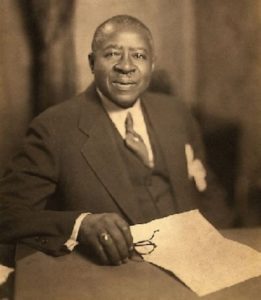
Robert S. Abbott
The birth of Robert Abbott in 1868 is marked on this date. He was a Black news businessman and lawyer.
Robert Sengstacke Abbotts' parents were former slave captives on St. Simon's Island, Georgia. Abbott studied at Claflin University, Hampton Institute, and Kent Law School in Chicago. He received his law degree in 1899 and was told that he was "too dark" to practice law in America. Abbott found it difficult to support himself as a lawyer. He became convinced that he could defend his people in public print better than he could in a courtroom, so he took a job learning the trade as a printer at his stepfather's newspaper.
Abbott borrowed a small amount of money and set up his printing equipment in his landlady's dining room with a folding card table and a kitchen chair as his office. On May 5, 1905, he started the Chicago Defender. He sold 300 copies of the four-page booklet by going door to door, visiting every barbershop, poolroom, drugstore, and church on the South Side of Chicago. He worked for 15 years and finally made a success (profit) out of the newspaper.
The Defender became a national newspaper with a circulation of 250,000 in 1929. Abbott's editorials demanded full equality for Blacks. The Defender fought for social justice and political and economic equality. It attacked discrimination, segregation, and lynching. The newspaper was credited with encouraging the migration from the South by providing information about job opportunities in the North during World War I. Hundreds of thousands of Blacks moved North because of his newspaper. Because of Abbott, The Defender became a thriving national institution. One of the nation's largest and most influential Black newspapers, by 1966; it was one of only two that was published on a daily basis out of 350 Black-owned newspapers.
To understand the significance of Black-owned newspapers one must understand the social context out of which they evolved. After Black Union servicemen helped defeat the Confederacy in the 449 documented battles that were fought, the Black soldier was turned out into a society legally free but penniless and unwanted. Rejected after the valiant efforts for Reconstruction, the Black community became a separate world, forced to do for itself or perish. Blacks had fought to preserve the United States and Blacks decided that to fight for all of the freedom promised to all white male citizens.
The weapon, mightier than the sword, was the pen, the Black newspaper. Abbott also published a short-lived paper called Abbott's Monthly. He died of Bright's disease on February 29, 1940, and left the paper in the control of his heir and nephew, John Sengstacke.
Reference:
The Lonely Warrior:
The Life and Times of Robert S. Abbott.
by Roi. Ottley,
Chicago: H. Regnery Co., 1955.